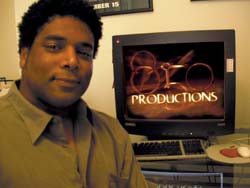|

Ten years ago when I started doing 3D, everything was Unix based, so animators tended to fall into a few basic categories: big & woolly, thin & earthy, or combinations there of. Everyone had impressive degrees from top design or engineering schools and used a common vernacular. Everyone except me. Big, black, and with no formal education, I looked more like a football player than a computer whiz.
I got my start at a CD-ROM company where my job was using Movie Shop to compress footage. They had SGI machines, so I came in at night, went through all the tutorials and books for Alias, ElectricImage, 3D Studio Max, Director, After Effects and Flint. Before long, I became their main production animator. But I wanted more. I wanted Hollywood.
I got lucky. A window had opened. CGI was exploding and post houses needed animators. It didn't matter that I didn't have a degree. I had a demo reel. Life was good and in less than a year I went from making $13.00 an hour at Universal Studios Tour to earning a six figure salary.
But not everything was smooth sailing. Day 1 at my new big Hollywood job: I approached the receptionist but before I could say my name, she instructed me to move a desk to the third floor. She said it was for Raymond King, a new animator. I made a crack about that being some initiation? Making everyone move their own furniture? The blood drained from her face. She began apologizing profusely. Turns out a runner started that same day and when she saw me approach, she just assumed I was he.
Once in, I felt pressure to prove I belonged. I learned Prisms and Renderman; bought books on "C" to get comfortable working in script-based as opposed to image-based software; wrote custom shaders; and added Houdini, Cineon and Composer to my arsenal. Most people were supportive, but some resented my being there or were intimidated by my growth and wanted to see me fail. Some gave me wrong answers when I asked questions. So I learned to problem solve on my own.
When I went to different companies, it didn't matter what software they were using, I either already knew it or picked it up quickly. When some houses didn't have the latest updates or versions, that only made me a stronger animator and technical director.
A fan of classic Hollywood films from the ‘30s and ‘40s, I integrated several of their lighting techniques into my work. That earned me a reputation for photorealistic lighting. Other animators began asking where I had gone to school. Too embarrassed to admit I hadn't, I elevated my Universal Studios job from sandwich kitchen to lighting grip.
In the late ‘90s, the industry changed. The software had become easier to learn and the market was flooded with animators fresh out of school who either used default sliders or who only knew how to do one thing, be it modeling, lighting, particles, whatever. They were cheaper and the belief was, just as good. Gone were the catered meals, the 4:00pm snack cart and my nice paying job.
Despite my resume and credits, I couldn't find work. I got called in for a lot of interviews, but wasn't hired. People grilled me on the software I claimed to know. Questioned whether or not shots on my reel were really mine. One or two practically called me a liar to my face. There were times when the salary in the ad was not the salary I was ultimately offered. But I ended up taking those jobs because I needed the work. I even allowed other companies to show my work as theirs, hoping they'd hire me if they landed a contract.
I've never been one to cry racism, but I know of at least one job I lost due to color. A human resource person was actually bold enough to say "I don't hire black people without educations." And she was black! I knew the only way to control my destiny was by starting my own company. Again, luck seemed to be on my side because the trend favored boutiques.
So now a lot of people are fighting for the same dollars. But I'm used to fighting for everything I've gotten. And there are several things in my favor that separate me from the pack. The obvious - I'm black. While there hasn't been an influx of black faces into digital production, let alone 3D, there has been a rise of black producers, directors and projects.
Then there's the technical. Everyone's got Macs but I find Unix to be more versatile. I'm using a Linux-based server to connect Mac G4s, Toshiba mobil and HP workstations. By cross platforming, I can optimize each machine for what it does best. From pre-vis to final compositing to DVD authoring, I am set up to do it all.
Flexibility is the key for me. Since my specialty is 3D, I can point clients to solutions they either never thought of, or thought they couldn't afford. My laptop workstations allow me to go on-site to do on-the-fly effects comps, reference tracking and trouble shooting, thereby averting potential problems and saving both time and money in post.
By offering fast, continually evolving and economical answers to digital problems, I plan to not only stay in this game, but to win. |